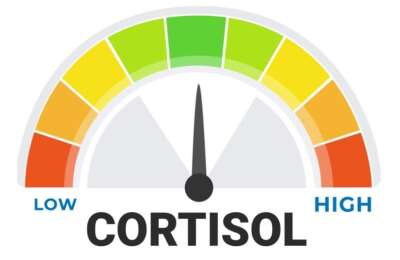
Stress – a six letter word that everyone is familiar with. It’s something we all experience, to one degree or another, and how we handle it can mean the difference between productivity and illness. Cortisol is the primary stress hormone that plays a crucial role in regulating metabolism, blood sugar and inflammation. Cortisol is one of the big guns and it has to be managed delicately. Let’s dig a little deeper.
Cortisol is produced by our adrenal glands, which look like two little hats sitting on top of the kidneys. Cortisol is released as part of the sympathetic nervous system “fight-or-flight” reflex. When this occurs, it decreases less critical functions like digestion, reproduction and immune function to focus on fighting any looming physical threats. This function of cortisol is meant to be immediate and momentary, enough to survive a physical challenge. This was effective for our human ancestors when they were hunted by prehistoric beasts, but it is less ideal in modern times when stress can be psychological and constant.
Cortisol plays a vital physiological role. When functioning optimally, we get a boost of cortisol when we first wake up in the morning, which adequately raises our blood pressure and allows us to get out of bed and start our day. At night, cortisol levels decrease, allowing for a deep and restful sleep. Under times of stress, cortisol raises plasma glucose levels and provides our body with the energy it needs to face bodily attacks from injury, illness or infection. It also has potent anti-inflammatory effects to reduce irritation and pain.
On the flip side, there are also negative effects of cortisol. Too much cortisol for an extended period of time can lead to serious health consequences. High cortisol levels can result in reduced protein synthesis and conversion of protein to glucose, increased abdominal fat, insulin resistance, increased cholesterol and blood pressure, tinnitus, vision issues, altered brain chemistry causing depression and anxiety and osteoporosis. It can also suppress levels of growth hormone and sex hormones, which can lead to reduced libido and infertility. If long term, extended periods of stress and elevated cortisol are not addressed, eventually our adrenal glands become overly exhausted and can’t produce enough cortisol (or other necessary hormones) to maintain normal physiological function.
There are several things that can be done to help manage cortisol and stress.
1. Get Adequate Rest – Aim for a solid 8 hours of sleep per night, practice good sleep hygiene and adopt a regular bedtime routine. In addition, mediation and yoga for even 15 minutes a day can help you find moments of calm.
2. Exercise Daily – 30 minutes of light exercise gets the blood moving and can help reduce cortisol levels. (However, avoid intense exercise in cases of low cortisol or adrenal fatigue.)
3. Eat a Whole Food, Plant Forward Diet – Studies show that a plant forward, whole food, anti-inflammatory diet of simple, cooked meals comprised of a wide variety of organic whole foods is what keeps the body functioning optimally. Everyone should aim to eat a colorful variety of fruits and vegetable, healthy fats such as avocado, coconut and olive oil, nuts and seeds and healthy proteins such as tofu, beans and lentils. Meats should comprise the least amount of your daily diet and should come from clean, organic sources that have been regeneratively raised.
4. Avoid Crutches – Things like foods full of refined sugar and processed ingredients, excess alcohol and caffeine, can all disrupt healthy cortisol signaling and negatively affect your mood, sleep and energy and these items should be limited or avoided. Other crutches like incessant scrolling on social media or binge watching tv can also disrupt your cortisol levels and should be monitored closely.
5. Consider Supplementation – If you are someone who has a job that requires a lot of travel or a busy mom trying to keep up with several kids, getting the proper nutrition can be an issue at times. This is where supplementation can be beneficial. Supplements should never be used in place of good nutrition, but they can be life savers for some people.
In East Asian medical theory, strong emotions like stress interrupt the body’s energy from flowing smoothly. When these strong emotions are present for long periods of time they create a blockage in the body’s energetic meridian system creating an energetic “traffic jam.” Acupuncture increases the circulation of blood and oxygenates the tissues throughout the body, while cycling out cortisol and releasing natural pain-killers called endorphins. Other benefits of acupuncture include decreasing the heart rate, lowering blood pressure and relaxing the muscles to help the body feel less stressed.
The East Asian Medicine (EAM) approach is to focus on restoring the balance of energy in the body, such as soothing the liver qi, tonifying the liver blood and spleen qi, clearing the heat in the heart and liver, etc. A combination of acupuncture and Chinese herbal medicines are generally applied and combined to treat stress. Other modalities like cupping, moxibustion, diet therapy and exercise may be suggested as well.
Imbalanced cortisol levels can have a profound impact on your health and quality of life. While lifestyle modifications such as rest, exercise and a balanced diet are crucial, acupuncture can be a valuable complementary therapy in managing cortisol levels naturally. By reducing stress, promoting relaxation and restoring balance in the body, acupuncture and East Asian Medicine can support overall well-being and help individuals regain control over their cortisol levels.

